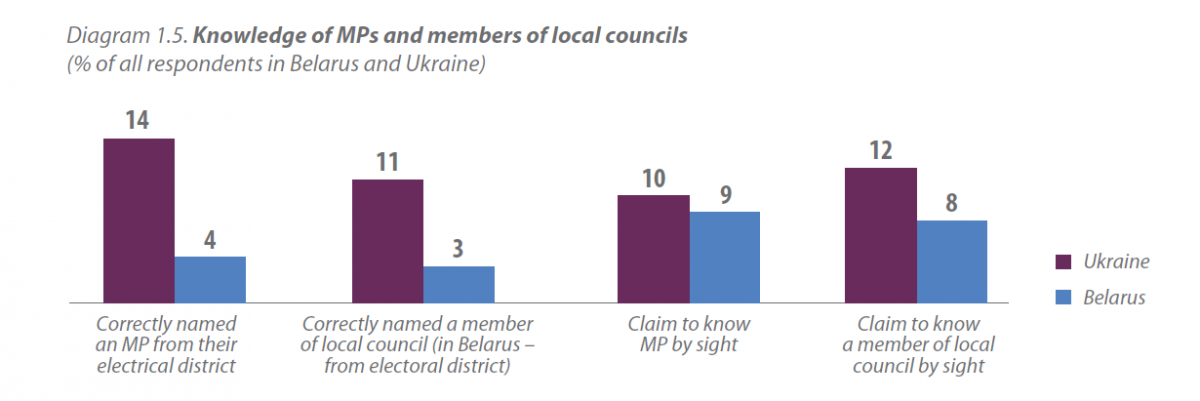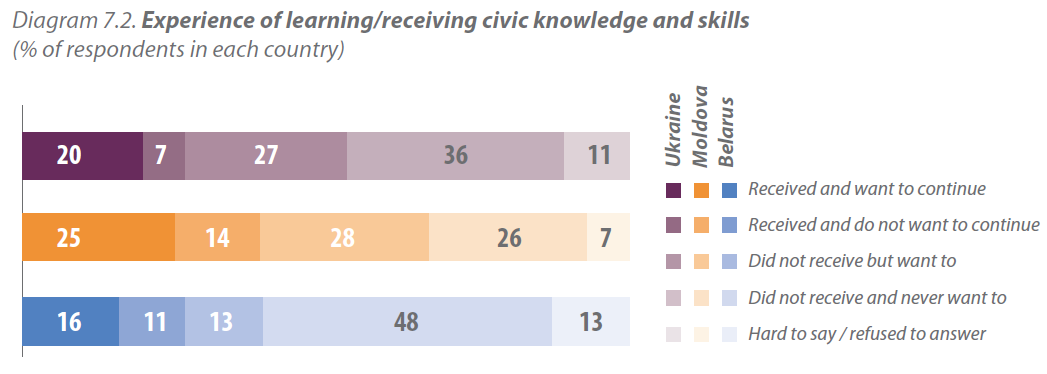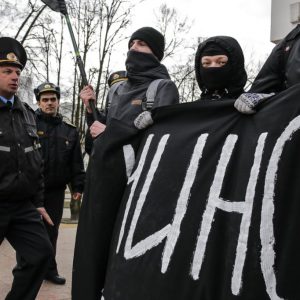Poor civic literacy in Belarus: a legacy of undemocratic rule

The recently published survey Civic Literacy in Ukraine, Moldova and Belarus revealed that the civic literacy rate is lower in Belarus than in Ukraine and Moldova, except when it comes to such issues as budget and taxes.
The survey attempted to determine how people in the three countries understand the principles of interaction between the state and citizens, how they participate in public life at the local and national level, and what kind of knowledge they are lacking. The survey sample in Belarus included 1005 people.
The results of the survey demonstrated that the restricted nature of civil society, freedom of speech, and political activism in Belarus has led to a citizenry unaware of its rights, alienated from politics, and reluctant to participate in community life and learn civic skills.
Civic literacy: the president as a source of sovereignty
The survey showed significant gaps in knowledge of state structure, regulatory frameworks, and citizen rights and duties among Ukrainians, Moldovans and Belarusians. The civic literacy rate appears to be somewhat higher in Belarus. Ukraine ranks second and Moldova third.

As for citizen rights, respondents of all countries mentioned the right to work most frequently. Belarus was the only country where freedom of speech was not among the top five answers. Having lived in a non-democracy for decades, Belarusians seem to value social and economic rights more than political rights.
In Belarus, citizens barely know their elected representatives. Many respondents do not know the official title of the legislative body or that the people are the sole source of power and sovereignty – as few as 33% believe that power comes from the people, while 55% name the President.
Civic participation: poor engagement and international isolation
More than half of respondents in the three countries participate in the life of their local community in some form: this may mean taking part in land improvement, joint activities with neighbours, etc. The share of citizens who report community participation in Ukraine is 63%, in Moldova 62%, and in Belarus 54%.
 In Moldova, the general rate of civic activism, readiness to take part in civic initiatives, and confidence in one’s own ability to influence life in the community/country is relatively higher than in Ukraine or Belarus. Of all the countries, Belarusians show the least amount of readiness to participate in public life.
In Moldova, the general rate of civic activism, readiness to take part in civic initiatives, and confidence in one’s own ability to influence life in the community/country is relatively higher than in Ukraine or Belarus. Of all the countries, Belarusians show the least amount of readiness to participate in public life.
Moreover, Moldovans are relatively more involved in the global context and Belarusians are involved the least, judging by indicators such as proficiency in foreign languages, experience travelling abroad, personal relations with people living abroad, desire to emigrate, and attitudes to international developments.

Civic attitudes and beliefs: Belarusians show intolerance to marginalised groups
Respect for human life, human rights, social justice, and adherence to the law were the values considered most important in Ukraine, Moldova, and Belarus. Respondents characterised good citizens as always abiding by the law, paying taxes, knowing his/her duties and rights, and protecting them.
Notwithstanding the declared respect for human rights, the survey indicates a certain degree of prejudice towards minorities. The respondents in all three countries would not tolerate living next to drug users, HIV-positive people, sexual minorities, and alcohol abusers; people with disabilities and people speaking other languages enjoy more positive attitudes. Comparing the two countries, Belarusians are more negative about living next to the majority of marginalised groups listed in the questionnaire. Belarusians are apparently less tolerant than they would like to believe.

Civic education: no will to learn in Belarus
The share of respondents potentially interested in civic education (those who want to obtain civic knowledge irrespective of whether they have such experience) in Ukraine is 47%, in Moldova 53% and in Belarus 29%. The top 3 areas in which respondents in these three countries wanted to improve their knowledge/proficiency are: human rights, foreign languages, and business and entrepreneurship.

The overall results of the survey show that restriction of civil society, freedom of speech, and political activism in Belarus has led to a citizenry unaware of its rights, alienated from politics, and unwilling to participate in community life and learn civic skills.
The second stage of the study used focus group discussions involving the public and researchers to better
understand the findings from the first stage. Based on the results of the survey, researchers formulated the following recommendations for civic education providers.
Recommendations regarding non-formal civic education programmes
- The NGO representatives participating in the survey consider it important to raise public awareness regarding the mechanisms of budgeting and public finance so that the people have a clear picture of how the money is spent. In addition, it is also critical to shape public attitudes to the state officials as the administrators rather than owners of public funds.
- It is recommended that civic education programmes use the positive connotation of the word ‘volunteer’ which has recently emerged, promoting the advantages of civic activism by visualising successful examples and experiences (‘act like me’), and focusing on how many social problems directly concern average citizens and how they can help find solutions.
- Experts note that one of the challenges of non-formal education (including civic education) is that no certificates are given to the graduates. Since the certification issue is associated with the quality of non-formal civic education, this should be a task of NGOs and the Ministry of Education, however complicated the process may be.
- Many people who are ready to receive non-formal civic education have unrealistic expectations. Sometimes they do not understand what is behind the names of the training programmes or lectures. Therefore, when inviting citizens to workshops or training events, it is critical to learn their expectations and explain to them the format and content of the training sessions.
- When it comes to the issue of payment, several experts believe that civic education should be paid (though perhaps with small fees) to prevent ‘training tourism’ and make sure that only motivated people attend training.
- Basic civic education should be taught in school. According to the experts, training should be provided by professionals who work in the area of civic education and civil society development rather than teachers of secondary or post-secondary schools.
The survey was carried out by the KIIS in Ukraine and CBS-AXA in Moldova and commissioned by UNDP Ukraine. In Belarus it was carried out by SBTC SATIO and commissioned by Pact Inc.
Read the full report Civic literacy in Ukraine, Moldova and Belarus in English.
Читать полный текст доклада Гражданственность в Украине, Молдове и Беларуси на русском.






